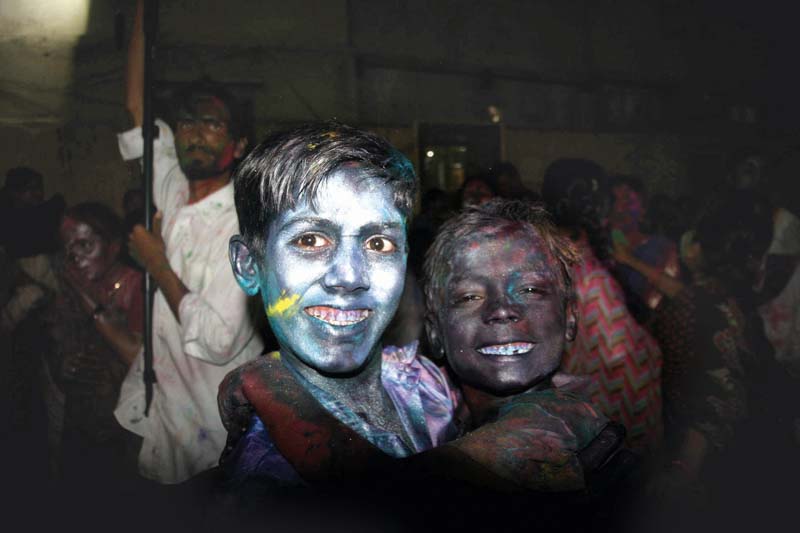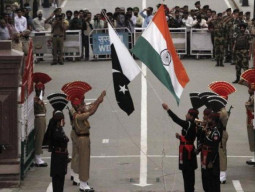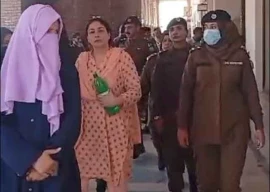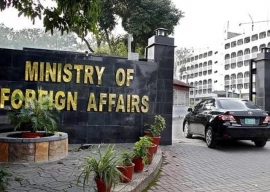
Hindus, Muslims, Christians, Sikhs, feminists, socialists and agnostics participated alike as Holi celebrations kicked off amid frolic and mirth at Swami Narayan Mandir in Karachi on Wednesday evening.

With Sufi musician Ayaz Soomro performing at the entrance of the vast temple premises, one was treated to a splash of colours. Young boys and girls, replete with the spirit of love that the occasion represents, ran towards friends and loved ones, carrying small amounts of powdered colour to rub into your face or sprinkle in your hair. Elderly women also stopped by if they saw you with a colourless face, only to give you a warm smile and dust some colour on your bare cheeks.

Inside the temple associated with Mata Jee [the Great Mother], with the famous 'Hare Krishna, Hare Rama' mantra playing in the background, a group of women paid their respects to the Hindu idols and wished believers happiness on the auspicious occasion.
Festival of colours: With prayers for peace, Holi celebrated in Pindi
"We have come here to show respect and express solidarity with our Hindu fellows," said Nilofur Farrukh, an artist and member of the Women Action Forum. "There is a dire need to celebrate such festivals together as Pakistanis."
 Qurrat Mirza and Niilofer Farrukh of Women Action Forum. PHOTO: SHUJA HAIDER
Qurrat Mirza and Niilofer Farrukh of Women Action Forum. PHOTO: SHUJA HAIDERWhen asked if Hindus ever stopped them from visiting the temple, Farrukh said they have instead always been very welcoming "But we have to respect them and their idols the way we would want other people to show respect in our mosques," she explained.
Artist Khuda Bux Abro also celebrated Holi at the temple. "I used to come here for eating vegetarian food as they would have some delicious dishes," he explains. "And that's how I got closer to my Hindu fellows. Today, it feels as if the time of 1970s has returned as I see a lot of people from different backgrounds here and the Sindh government has also declared a holiday on Holi in an attempt to spread religious harmony."

Wearing a turban and 'kara' around his wrist, Pakistan Sikh Council patron-in-chief Sardar Ramesh Singh appeared elated. Singh is a Sikh but says the love for Hindus in his heart is what makes him attend the celebrations every year.
"Today's celebrations have an increased importance for all of us. Holi fell on March 23, Pakistan Day, which is also the anniversary of freedom-fighter Bhagat Singh's martyrdom. The Sindh government elevated our happiness by granting a public holiday on this occasion. Things seem to be going in the right direction," he said.
 Patron-in-chief Pak Sikh Council Sardar Ramesh Singh Khalsa at Holi celebration. PHOTO: SHUJA HAIDER
Patron-in-chief Pak Sikh Council Sardar Ramesh Singh Khalsa at Holi celebration. PHOTO: SHUJA HAIDERA number of three-dimensional artworks at the mandir, one of which depicts Lord Shiva emerging from the mountains, amazed the non-Hindu attendees.
And then there was the ground where a large Holika bonfire wowed visitors, amid loud music and dance. The ritual, which is observed to symbolise the burning of Holika, the devil, is part of the whole concept of Holi signifying the victory of bhakti [love for God] over evil and is known as Holika Dahan.
While women throw grain in the fire to please the gods, newly-wed couples walk around the pyre as part of completing a rite that is believed to make their bond stronger, explained Virag Bagra who performed the ritual with his wife.

When asked about Holi, a Hindu family sitting at the mandir told The Express Tribune that they make new white clothes each year for the occasion.
"Rung dhul jata hai [The colour washes away]," said a woman, answering a question about how she wipes the colour off her children's faces before sending them to school the next day.
 An idol of Lord Shiva especially designed for Holi at Swami Narain temple in Karachi. PHOTO: SHUJA HAIDER
An idol of Lord Shiva especially designed for Holi at Swami Narain temple in Karachi. PHOTO: SHUJA HAIDERPublished in The Express Tribune, March 25th, 2016.










































COMMENTS (6)
Comments are moderated and generally will be posted if they are on-topic and not abusive.
For more information, please see our Comments FAQ